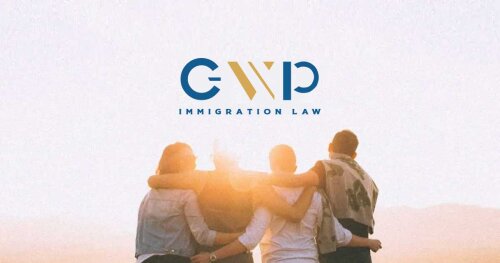Best Golden Visa Lawyers in Las Vegas
Share your needs with us, get contacted by law firms.
Free. Takes 2 min.
List of the best lawyers in Las Vegas, United States
About Golden Visa Law in Las Vegas, United States
"Golden Visa" is a common industry term used to describe investor-immigration pathways that grant permanent residency in exchange for qualifying capital investment. In the United States the closest equivalent is the EB-5 Immigrant Investor Program. EB-5 allows foreign investors and their immediate families to pursue conditional permanent residency based on a qualifying investment that creates or preserves at least ten full-time U.S. jobs.
In Las Vegas and the broader Nevada area, EB-5 projects may include commercial real estate, hospitality and resort developments, infrastructure projects, and operating businesses. Investors can choose to invest directly in a new commercial enterprise or indirectly through a USCIS-designated regional center that pools capital for larger projects. Local legal, business and regulatory rules in Nevada and in Clark County can affect project structure, business formation and compliance.
Why You May Need a Lawyer
EB-5 and related investor-immigration matters are complex and require coordination among immigration, corporate, securities and tax law. You may need a lawyer in the following common situations:
- Preparing and filing the investor petition - preparing the immigration petition to USCIS and collecting documentary evidence of source of funds and lawful investment.
- Selecting and evaluating a project or regional center - reviewing offering documents, business plans, economic impact and job-creation methodology.
- Structuring the investment - forming or reviewing U.S. business entities, negotiating subscription agreements, operating agreements or joint-venture agreements, and addressing state regulatory compliance.
- Securities compliance - evaluating whether an offering is a security and whether federal or state securities laws apply to the investment.
- Tax planning - analyzing U.S. federal and Nevada tax consequences, cross-border tax planning and reporting obligations.
- Removing conditions - preparing the petition to remove conditional permanent residency once job creation and other requirements have been satisfied.
- Handling adverse developments - responding to Requests for Evidence, denials, regulatory investigations, fraud concerns or project failures.
Local Laws Overview
When pursuing an EB-5 investment in Las Vegas, key local and state legal considerations include the following:
- Business formation and licensing - Nevada is a business-friendly state with common use of limited liability companies. Depending on the project you may need Clark County or City of Las Vegas business licenses, zoning approvals, building permits and trade licenses for construction or hospitality operations.
- Real estate and zoning - Las Vegas projects must comply with local zoning, land-use and permitting rules. Hotels, casinos and large mixed-use developments typically face additional regulatory and municipal review.
- State taxes and incentives - Nevada has no state personal income tax, which can be attractive for some investors. Sales and property taxes, transient lodging taxes and business licensing fees do apply. State or local economic development incentives may be available for certain projects.
- Securities and offering rules - If an EB-5 investment is structured as a securities offering, it may be subject to federal securities law and to Nevada securities and business opportunity regulations. Offer documents, disclosures and broker-dealer involvement may raise additional legal obligations.
- Labor and employment law - Job-creation claims must meet federal EB-5 requirements for full-time employment. Local employment practices, wage rules and licensing for certain trades can affect compliance and projections.
- Consumer and hospitality regulation - Hospitality or gaming-related businesses in Las Vegas face industry-specific rules. Gaming-licensed operations require separate regulatory approvals and background checks that can affect eligibility.
Frequently Asked Questions
What is the basic requirement to qualify for an EB-5 or "Golden Visa" in the United States?
At a high level the investor must place qualifying capital into a new commercial enterprise in the United States that will create or preserve at least ten full-time U.S. jobs for qualifying workers. The investment must be at risk and for the purpose of generating a return. Investors and their qualifying family members may obtain conditional permanent residency, which can later be converted to permanent residency after demonstrating compliance with program requirements.
How much money do I need to invest?
Investment thresholds and regulatory requirements change over time. Historically there have been higher and lower investment levels depending on whether the investment is in a targeted employment area. Exact dollar amounts, adjustment rules and USCIS guidance can change, so you should consult an immigration attorney or check current USCIS guidance to confirm the required investment level for your case.
What is a regional center and should I use one?
A regional center is a USCIS-designated organization that sponsors EB-5 projects and pools investor capital into larger developments. Regional centers typically use indirect-job counting methods based on economic modeling, which can make it easier for investors to meet the job-creation requirement. Direct investment means investing in a company where job creation is counted directly. Choosing a regional center involves due diligence on the centers track record, project financials, legal disclosures and alignment with your immigration timetable and risk tolerance.
How long does the EB-5 process take?
Processing times vary and depend on USCIS workload, the nature of the petition, whether consular processing is required, and national visa availability. The initial petition, consular interview or adjustment of status to conditional permanent residency, and the later petition to remove conditions each have separate timelines. In addition, visa numbers may be subject to backlog or priority date retrogression for certain countries, which can add years to the timeline for nationals of countries with high demand.
What documents will I need to prove source of funds?
USCIS expects credible documentation showing lawful sources of the investment funds. Typical evidence includes corporate records, tax returns, bank statements, business sale agreements, investment statements, gift affidavits, loan agreements and other documents that trace the funds path. The required documentation can be extensive and often needs careful legal review and organization by an attorney experienced in EB-5 source-of-funds work.
What happens if the project I invest in fails to create the required jobs?
Job-creation is a central requirement for removing conditional status. If the project does not produce the required jobs, the petition to remove conditions may be denied. Investors can mitigate this risk by choosing projects with credible economic analyses, reserve plans, or alternative job-counting strategies and by seeking legal advice about available remedies, such as demonstrating that your investment sustained commercial activity or identifying other qualifying job creation efforts.
Are there tax implications I should consider in Nevada or federally?
Yes. Federal taxes apply to income and business receipts, and your investment structure may create U.S. tax reporting and payment obligations. Nevada has no state personal income tax, which may be advantageous, but state and local business taxes, sales taxes and property taxes can apply. Cross-border tax planning, reporting of foreign financial accounts, and estate planning issues should be reviewed with a qualified international tax advisor and an attorney familiar with U.S. and Nevada tax matters.
Can I live and work anywhere in the United States while my EB-5 petition is pending?
Conditional permanent residents typically have the right to live and work anywhere in the United States. Before receiving conditional residency, an applicant with a pending immigrant petition may need appropriate nonimmigrant status to lawfully live and work in the United States. Discuss timing and status issues with an immigration lawyer to avoid gaps in authorization.
How do I choose a qualified EB-5 lawyer in Las Vegas?
Look for attorneys who specialize in EB-5 and have experience with investor petitions, regional center and project work, securities and business structuring, and source-of-funds documentation. Check credentials, experience with similar projects, client references and disciplinary history through the State Bar of Nevada. Consider working with a team that includes immigration counsel plus local business, securities and tax advisers when necessary.
What are common red flags or risks I should watch for in an EB-5 project?
Common red flags include lack of transparent financials or audited statements, overly optimistic financial projections with no conservative sensitivity analysis, undisclosed or undisclosed litigation or regulatory issues, poor or nonexistent track record of the regional center or developers, complex or unclear exit strategies, conflicting or missing offering materials, and pressure to invest quickly without time for due diligence. A careful legal and financial review can help identify and mitigate many risks.
Additional Resources
For authoritative information and official guidance consult relevant U.S. federal and Nevada agencies and professional organizations. Helpful sources include U.S. Citizenship and Immigration Services for program rules and forms, the U.S. Department of State for visa availability and the Visa Bulletin, the U.S. Securities and Exchange Commission for securities offering guidance, the Internal Revenue Service for tax rules, and the Nevada Secretary of State for business formation and registration. Locally you may also consult Clark County and City of Las Vegas permitting and licensing offices, and the State Bar of Nevada for attorney referrals and disciplinary information.
Next Steps
If you are considering an EB-5 or "Golden Visa" path in Las Vegas follow a structured approach:
- Gather preliminary information - identify the project or regional center, collect basic financial records, and summarize your immigration goals and timeline.
- Arrange an initial consultation with an experienced EB-5 immigration attorney - discuss eligibility, documentation needs, and the regulatory landscape.
- Conduct due diligence - with legal and financial advisors review offering documents, economic reports, developer track record and risk factors. If securities are involved, include a securities lawyer in the review.
- Prepare source-of-funds documentation - work with accountants and counsel to trace funds and assemble supporting evidence in an organized manner.
- Structure the investment and filing strategy - decide between direct investment and a regional center, create U.S. entities if needed, and plan immigration filings and tax compliance.
- Monitor the project and maintain records - keep detailed records of business activity, job creation evidence and ongoing compliance to support future petitions to remove conditions.
If you need help finding a qualified attorney in Las Vegas ask for referrals from the State Bar of Nevada, request examples of recent EB-5 cases handled by the attorney, and ask for a clear engagement letter outlining services, fees and expected timelines. Careful, early legal guidance will reduce risk and improve your chances of a successful outcome.
Lawzana helps you find the best lawyers and law firms in Las Vegas through a curated and pre-screened list of qualified legal professionals. Our platform offers rankings and detailed profiles of attorneys and law firms, allowing you to compare based on practice areas, including Golden Visa, experience, and client feedback.
Each profile includes a description of the firm's areas of practice, client reviews, team members and partners, year of establishment, spoken languages, office locations, contact information, social media presence, and any published articles or resources. Most firms on our platform speak English and are experienced in both local and international legal matters.
Get a quote from top-rated law firms in Las Vegas, United States — quickly, securely, and without unnecessary hassle.
Disclaimer:
The information provided on this page is for general informational purposes only and does not constitute legal advice. While we strive to ensure the accuracy and relevance of the content, legal information may change over time, and interpretations of the law can vary. You should always consult with a qualified legal professional for advice specific to your situation.
We disclaim all liability for actions taken or not taken based on the content of this page. If you believe any information is incorrect or outdated, please contact us, and we will review and update it where appropriate.














